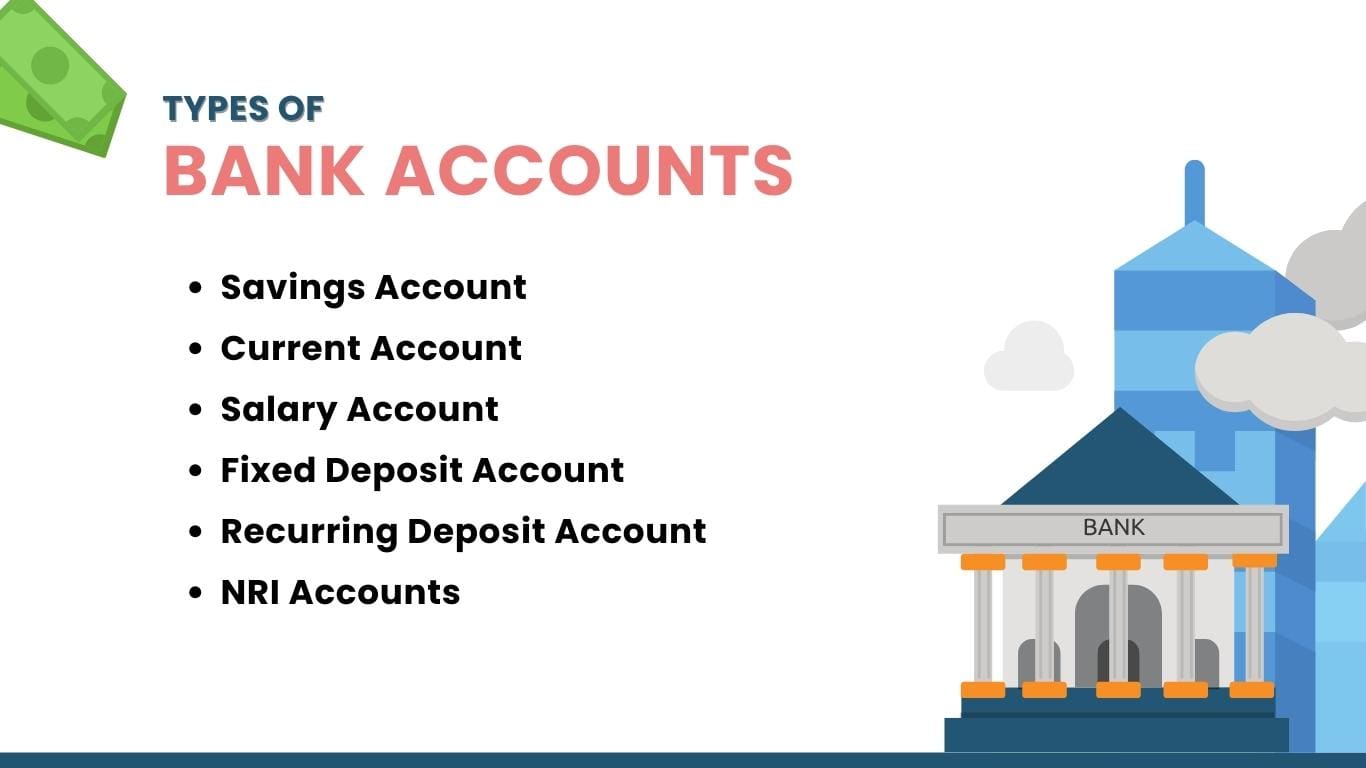
As technology progresses, many things become our basic requirements. One such thing is a bank account. Among many things, technology also impacted banking. Most people have one, and those who don’t are likely planning to get it. No doubt, you can store your money in physical cash, but is that feasible anymore? We have learned our lesson the hard way during the 2016 Indian banknote demonetization. That leads us to believe opening a bank account is the safest option to achieve financial security.
However, there are several kinds of bank accounts to choose from, each designed for a specific purpose. Hence, in this study, we will explore the various types of bank accounts and their features.

These are the types of bank accounts:
| Account Type | Interest-Earning | Transaction Limit | Minimum Balance | Best For |
|---|---|---|---|---|
| Savings Account | Yes | Limited | Required | Individuals seeking to save and grow money |
| Current Account | No | Unlimited | Usually required | Businesses and traders for daily operations |
| Salary Account | Yes | Varies by bank | Not typically required | Employees receiving regular salaries |
| Fixed Deposit Account | Yes, higher | N/A (one-time deposit) | Required (Deposit amount) | People wanting guaranteed returns on lump-sum savings |
| Recurring Deposit Account | Yes | N/A (fixed regular deposits) | Required (Regular deposit amount) | People with regular incomes wanting to save a fixed sum monthly |
| NRI Accounts | Yes | Varies by account type | Varies by account type | Non-residential Indians maintaining and managing income in India |
1. Savings account
Banks and other financial institutions offer you to open a savings account with them. You can store your money, and they will pay you interest on it. This lets you achieve financial security and makes your deposit grow over time. Using a savings account also lets you manage your finances and fulfill your long-term financial goals.
The best part? It’s quite simple to open a savings account — you can either do so online or by visiting a physical branch. This way, you can lower your unnecessary spending and easily conduct transactions in times of need. Nearly all banks, and not only local ones, offer savings account options. Thus, you can compare interest rates and choose the one that works best for you.
Savings Account Features:
- For saving money.
- Earns interest.
- Limited transactions.
- Requires minimum balance.
- Accessible via ATM, online, and mobile banking.
2. Current account
As mentioned earlier, a bank designs different types of accounts with users’ needs in mind. So if you run a business or must conduct multiple transactions daily, the current account is for you. Unlike a savings account, you do not gain interest for depositing your money. Also, using a current account streamlines everyday transactions.
For instance, it offers features such as demand drafts, pay-orders, and checks that enable direct payment to creditors. The current account holder enjoys the benefit of an overdraft facility. Using this feature, they can withdraw the amount from the bank even when their balance is zero. The amount must be returned within the specified timeline, and the bank charges the overdraft fee.
Current Account Features:
- For frequent transactions.
- Suitable for businesses.
- No transaction limit.
- Does not earn interest.
- Overdraft facilities are often available.
3. Salary account
A salary account creates a win-win situation for both employers and employees. Employers can easily credit the monthly salary of their employees, whereas employees can get their payroll along with additional benefits bundled with a salary account.
A few of these perks are the Demat (Dematerialized) account, NetBanking, and loan conveniences. It is essentially a type of savings account with a key difference — individuals cannot open it in their name. Considering it is designed for distributing the monthly salary, firms need to have a tie-up with the bank to open wage accounts for their workers.
Salary Account Features:
- For salary disbursement.
- No minimum balance.
- Special offers and perks.
- Converts to regular savings if the salary is not credited for long.
- Some banks provide free debit card services.
4. Fixed deposit account
The fixed deposit concept involves the account holder depositing specific amounts of money for a fixed period without withdrawing them. In turn, banks give them a fixed rate of interest. This kind of account also permits investors to select the tenure and predetermine interest. The result is higher security and a superb option for stable investments since it is independent of the market conditions.
Moreover, financial institutions guarantee the returns and investors can even opt for periodic interest payouts. The reason banks provide fixed deposits is that they require funds to provide loans to customers.
Fixed Deposit Account Features:
- Money deposited for a fixed term.
- Earns higher interest.
- Early withdrawal penalty.
- Loan against deposit available.
- Interest can be paid out monthly, quarterly, or at maturity.
5. Recurring deposit account
The concept of deposit accounts intrigues many, but not everyone has sufficient funds to invest. This shouldn’t discourage investors from exploring this option, however. So we have an alternative — the recurring deposit.
In a recurring deposit account, instead of placing huge investments in one go, you can invest the funds monthly. This way, you can take out some money to save while simultaneously earning interest on the remainder. This instills savings behavior among the public, and since you can invest in parts instead of the lump sum, it can feel like less of a burden.
Recurring Deposit Account Features:
- Regular deposits over time.
- Fixed sum deposited each month.
- Similar interest to fixed deposits.
- Penalty for missed payment.
- The maturity period ranges from 6 months to 10 years.
6. NRI accounts
Even if you are an NRI (Non-Resident Indian), the bank has got your needs covered. NRIs often have earnings both abroad and in their home countries, so an NRI account allows them to transfer funds or repatriate money. Plus, opening this type of bank account is very convenient. You don’t even have to visit the branch in India; you can courier the documents to their address.
Furthermore, if you already have an existing resident account, you can simply convert it into an NRI. Finally, there are three distinct types of NRI bank accounts: NRO, NRE, and FCNR.
6.1 – Non-resident ordinary account (NRO)
NRIs open an NRO account to manage their income earned in India. These accounts accept money deposited in foreign and Indian currency alike but support withdrawal in INR (Indian rupee). NRE account holders also enjoy the benefit of tax exemption, whereas NRO account interests are taxable at 30%.
Why would someone use them, then? Well, with NRO accounts, there are no exchange rate risks. That’s because money is both deposited and withdrawn in INR. In contrast, the NRE account requires the amount to be deposited in foreign currency and withdrawal made in INR. That makes the latter type of banking account dependent on currency fluctuations.
6.2 – Non-resident external account (NRE)
In NRE, an NRI opens an account in India to transfer their foreign earnings. Banks then convert those funds into INR based on the exchange rate at the time of deposit. Fundamentally, this account is used by NRIs to save their money earned abroad.
As mentioned, it comes with a perk of tax exemption among others, allowing users not only to conserve money but earn interest on it. Since the money transferred here is converted into INR, the account holder can easily withdraw a portion in that currency.
6.3 – Foreign currency non-resident account (FCNR)
FCNR is a fixed deposit account opened by an NRI that allows them to transfer their income in foreign currency. Since they can keep their income without conversion to INR, the risk of financial loss due to currency fluctuations is lower. Additionally, the amount deposited in this account is not taxable, allowing them to invest for ample returns.
NRI Account Features:
- For Indians living abroad.
- Includes NRE, NRO, and FCNR accounts.
- Different taxation rules.
- Repatriation depends on account type.
- Can be jointly held with residents or non-residents.